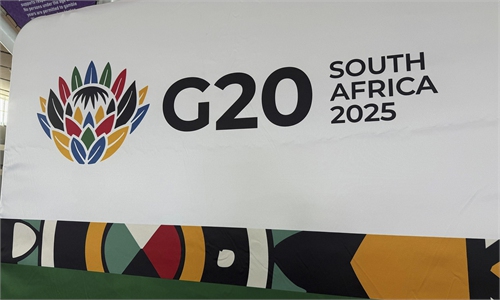China advocates multilateral cooperation, dialogue to resolve trade and tariff disputes at G20 finance meetings
Chinese Central Bank Governor Pan Gongsheng and Chinese Finance Minister Lan Fo'an delivered key remarks at the second G20 Finance Ministers and Central Bank Governors Meeting of the year, held in Washington DC from Wednesday to Thursday, emphasizing China's support for multilateralism and coordinated global action to address various challenges.
Hosted by G20 Chair South Africa, the meeting focused on the global macroeconomic situation, financial stability, the international financial architecture and the promotion of growth and development in Africa.
Pan warned that economic fragmentation and trade tensions are disrupting global industrial and supply chains, undermining the momentum of global economic growth. He emphasized that trade wars and tariff wars have no winners, and urged major economies to strengthen international macroeconomic and financial policy coordination, take substantive actions to promote cooperation, and safeguard global economic and financial stability, according to a release on the website of the People's Bank of China on Friday.
Pan also highlighted China's solid economic start in 2025, noting a steady recovery and stable financial markets. He added that the central bank will implement a moderately accommodative monetary policy to support the high-quality development of the Chinese economy.
Lan stated that China firmly upholds the multilateral trading system centered around the WTO. He advocated for resolving trade and tariff disputes through equal dialogue and negotiation and emphasized China's commitment to firmly safeguarding its legitimate rights and interests, according to a press release from the Ministry of Finance on Friday.
Lan noted that all parties should work to further improve the international economic and financial system through strengthened multilateral cooperation. He called for active promotion of the reform of multilateral development banks, effective advancement of the equity review of the International Bank for Reconstruction and Development, pragmatic improvement in the implementation of the Common Framework for Debt Treatment beyond the Debt Service Suspension Initiative, and encouragement for international financial institutions and the private sector to provide more support for vulnerable countries facing debt and liquidity challenges.
All parties should pool more resources for Africa's development, strengthen the capacity-building of African institutions, and take opportunity of digitalization and green transformation to inject new impetus into Africa's economic growth, Lan noted. He also highlighted the positive trend and policy orientation of China's economy and the key measures China has taken to support Africa's development.
During the meeting, Lan also held bilateral meetings or exchanges with counterparts from South Africa, the EU, Pakistan, Germany, South Korea, Indonesia, the UK, Japan, and the World Bank, discussing macroeconomic trends, G20 agenda items, and bilateral cooperation.
Participants pointed out that while the global economy continues to recover, downside risks have significantly increased, accompanied by trade tensions, tightening financing conditions, and long-term structural challenges. All parties expressed concern about the negative impacts of escalating trade frictions, calling for strengthened dialogue and policy coordination, improvements to the multilateral trading system, and the pursuit of solutions that align with the interests of all sides. They supported building a more stable, efficient, and resilient international financial architecture, enhancing the financing capabilities of multilateral development banks, and continuing to provide development financing.
Global Times
Hosted by G20 Chair South Africa, the meeting focused on the global macroeconomic situation, financial stability, the international financial architecture and the promotion of growth and development in Africa.
Pan warned that economic fragmentation and trade tensions are disrupting global industrial and supply chains, undermining the momentum of global economic growth. He emphasized that trade wars and tariff wars have no winners, and urged major economies to strengthen international macroeconomic and financial policy coordination, take substantive actions to promote cooperation, and safeguard global economic and financial stability, according to a release on the website of the People's Bank of China on Friday.
Pan also highlighted China's solid economic start in 2025, noting a steady recovery and stable financial markets. He added that the central bank will implement a moderately accommodative monetary policy to support the high-quality development of the Chinese economy.
Lan stated that China firmly upholds the multilateral trading system centered around the WTO. He advocated for resolving trade and tariff disputes through equal dialogue and negotiation and emphasized China's commitment to firmly safeguarding its legitimate rights and interests, according to a press release from the Ministry of Finance on Friday.
Lan noted that all parties should work to further improve the international economic and financial system through strengthened multilateral cooperation. He called for active promotion of the reform of multilateral development banks, effective advancement of the equity review of the International Bank for Reconstruction and Development, pragmatic improvement in the implementation of the Common Framework for Debt Treatment beyond the Debt Service Suspension Initiative, and encouragement for international financial institutions and the private sector to provide more support for vulnerable countries facing debt and liquidity challenges.
All parties should pool more resources for Africa's development, strengthen the capacity-building of African institutions, and take opportunity of digitalization and green transformation to inject new impetus into Africa's economic growth, Lan noted. He also highlighted the positive trend and policy orientation of China's economy and the key measures China has taken to support Africa's development.
During the meeting, Lan also held bilateral meetings or exchanges with counterparts from South Africa, the EU, Pakistan, Germany, South Korea, Indonesia, the UK, Japan, and the World Bank, discussing macroeconomic trends, G20 agenda items, and bilateral cooperation.
Participants pointed out that while the global economy continues to recover, downside risks have significantly increased, accompanied by trade tensions, tightening financing conditions, and long-term structural challenges. All parties expressed concern about the negative impacts of escalating trade frictions, calling for strengthened dialogue and policy coordination, improvements to the multilateral trading system, and the pursuit of solutions that align with the interests of all sides. They supported building a more stable, efficient, and resilient international financial architecture, enhancing the financing capabilities of multilateral development banks, and continuing to provide development financing.
Global Times

